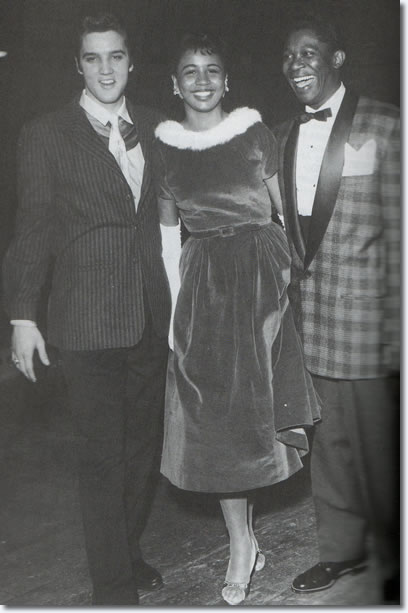
Elvis Presley with Claudia Ivy and BB King
“Elvis, was a hero to most, but he never meant shit to me, you see, straight out racist that sucker was, simple and plain, motherf**k him and John Wayne…”
-Chuck D of Public Enemy, “Fight The Power”
I’ve written before about my near-lifelong admiration of Elvis Presley. As a Black man, I have occasionally been questioned by other Black people about this admiration, based on the belief some Blacks have that Elvis was “racist”, and that his music career was based on his “stealing” from Black musicians, and therefor being credited (by White music critics and historians) as the “King of Rock N Roll” over more-deserving Black musicians. There is also a quote that was long-attributed to Elvis, which some continue to believe that he said:
“The only thing Negroes can do for me is shine my shoes and buy my records”.
Sometimes he’s quoted as having said “Coloreds” or “Blacks” or even “niggers”, but the general point of the line remains the same, to show that Elvis had a low opinion of Black people.
This was brought up in the comments of my post ELVIS (THE MINISERIES) by Chocolate Matters (who, like me, is also a Black man), who had previously discussed it on his own blog in this post ELVIS AND THAT RUMOR…
Well, as I said, I’d heard of the quote many years ago, and having read multiple books about Elvis, watched films and documentaries about him, and read and seen many interviews with people who knew him, I do not believe that Elvis ever said anything remotely like that. There is zero credible evidence that Elvis harbored those types of feelings and, to the contrary, he always was friendly and comfortable around Black people and treated them just like anybody else. In fact, his earliest fans were Black kids who liked his music (which “sounded Black”), and he would appear before and perform in front of predominantly Black audiences, alongside Black singers.
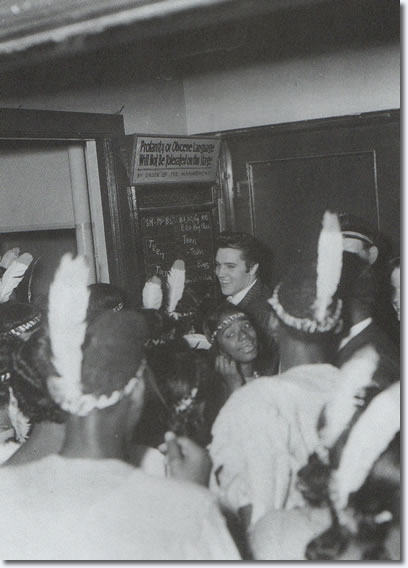
Elvis, backstage at a concert sponsored by WDIA, the first Black-owned radio station in Memphis, 1956
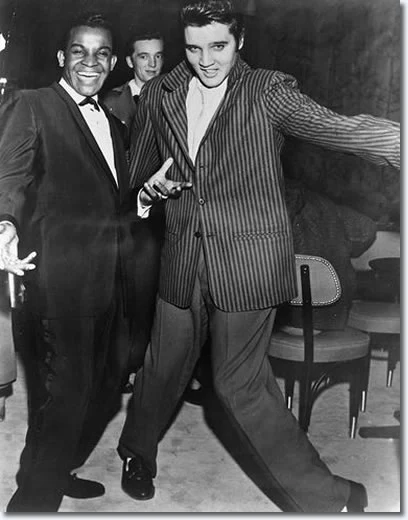
Elvis with Billy Ward
He counted many Black celebrities of his time as friends.
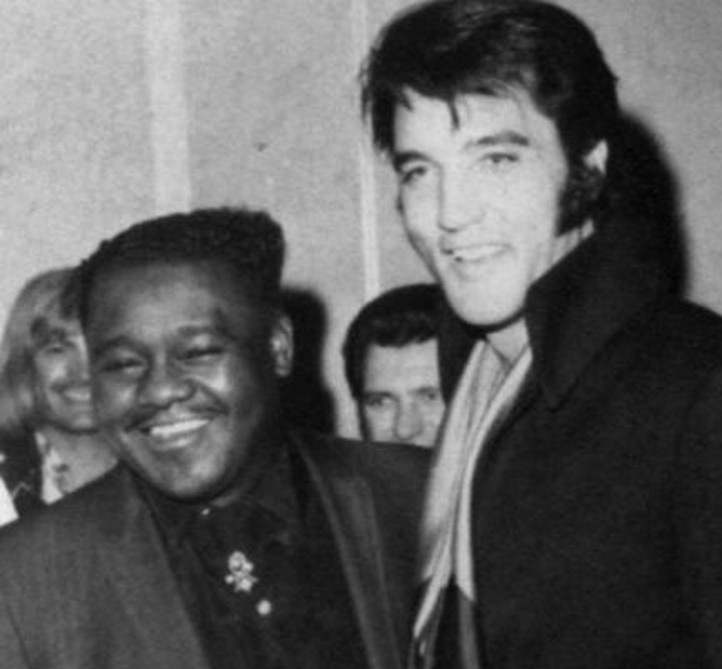
Elvis and Fats Domino
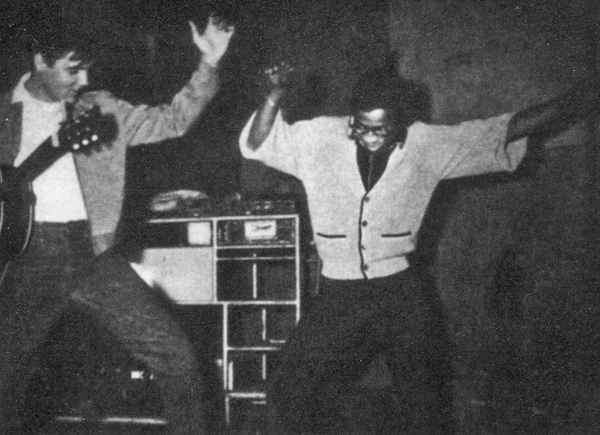
Elvis and Sammy Davis Jr.
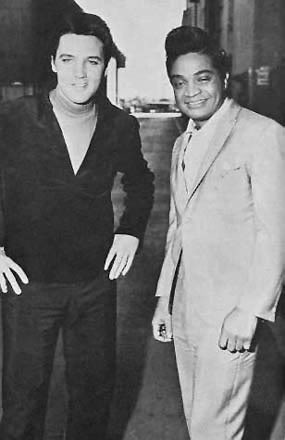
Elvis and Jackie Wilson
Including, later in his life, striking up a friendship with Muhammad Ali, even giving him a gift of a special robe Elvis had made for him, that said “People’s Champ” on the back.
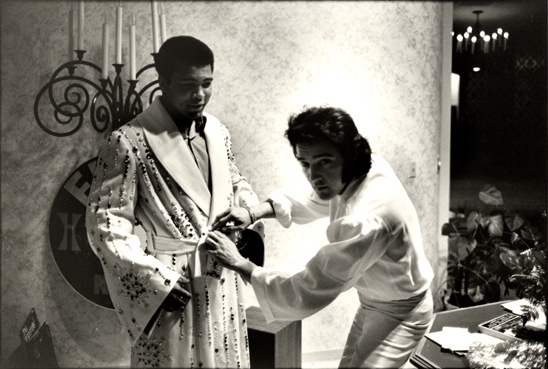
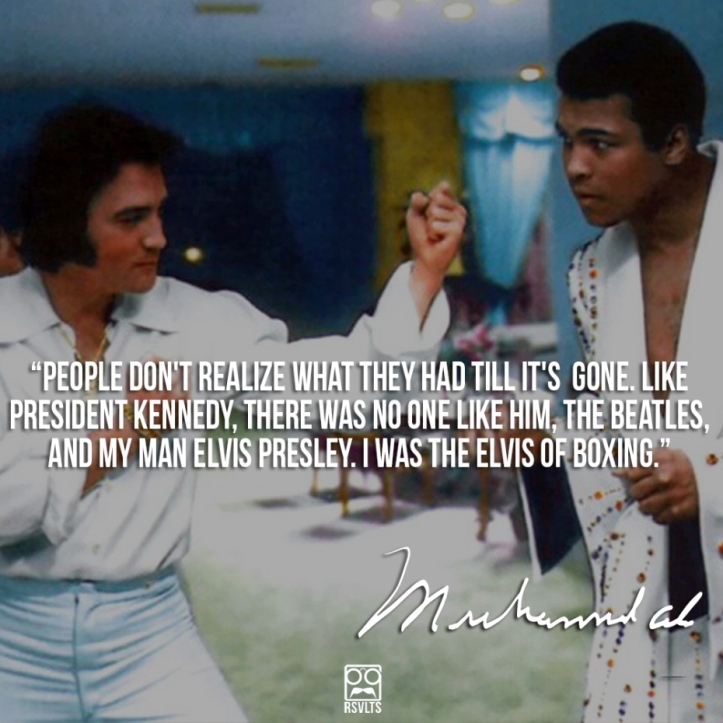
So there’s Elvis, the good ol’ Boy who, when he was drafted, went into the Army and served proudly, with Muhammad Ali who famously dodged the draft and refused to fight, which made him hated for many years by a large segment of the American population. But Elvis didn’t care about that, he just admred Muhammad’s style and showmanship. Both of them were rather flamboyant when it came to performing, so that’s what they had in common.
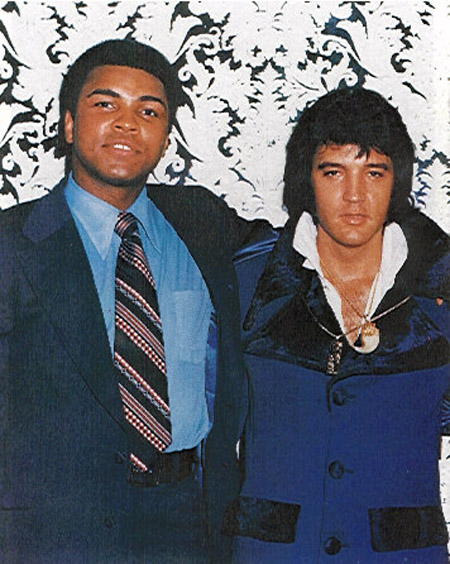
Throughout Elvis’ life, from childhood to adulthood, Elvis always referred to anyone older than him, including Black folks, as “Sir” or “Ma’am”. There’s also the famous story retold by many of his acquaintances of one time when he was at a car dealership with his friends, and happened to see a random older Black woman walking by, just looking at the cars, and Elvis ran up to her and bought her a Cadillac on the spot, just for the heck of it. Because that’s the kind of thing Elvis did (which also explains why, at the time of death, his estate was almost broke, and heavily in debt….).
As for stealing the Black man’s music. Let’s be clear, Elvis was a real genuine fan of what was considered “Black” music at the time. Blues, and early Rock N Roll. That was the music he grew up listening to. Ike Turner, who composed Rocket 88, which many music historians consider to be the first official “Rock n Roll” song, told the story of how he knew Elvis when Elvis was a young boy, because Elvis used to sneak into a Blacks-Only club that Ike would perform at, and Ike would let Elvis sit backstage and watch the Black singers perform. That was the type of music that Elvis loved, and he grew up wanting to play it. And he was occasionally mocked by other White kids for his style. And in the beginning of his career, this type of music was a hindrance to his advancement, as there were many White-owned radio stations that initially refused to play his records on the air, because they thought he was Black.
But as his fame grew, many of those same stations would play Elvis’ records, while continuing to refuse to play similar records by Black singers. Likewise, concert promoters would book Elvis to perform in venues that wouldn’t book Black singers, and he would get to perform on TV shows that wouldn’t book Black singers. In a segregated America, where a growing number of White youths were listening to this new Rock N Roll music, Elvis Presley was seen as a perfect compromise. Essentially he was looked at as a Black performer in Whiteface. And that was totally unfair to the Black pioneers of that music. There is no denying that. And other promoters and record companies tried to capitalize on Elvis’ success, such as where Pat Boone would cynically re-record songs that were originally recorded by Black singers like Little Richard, so White radio stations that wouldn’t play Little Richards music could now play Pat Boone’s music. Again, no denying that those were unfair racist practices, but Elvis should not be compared to Pat Boone, who was a complete fraud and opportunist. To put this in a modern context, Elvis was Eminem, while Pat Boone was Vanilla Ice.
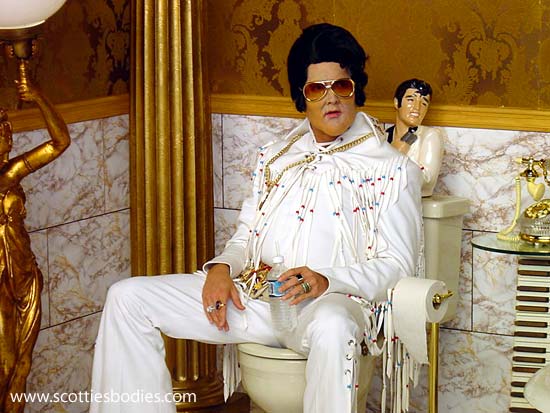
“Although I’m not the first king of controversy, I am the worst thing since Elvis Presley, to do Black music so selfishly, and use it to make myself wealthy”
-Eminem, “Without Me”
I know it’s a bit of a cliché by now to compare Elvis and Eminem, but there some striking similarities. Eminem grew up with a genuine love for what is considered “Black music” of the time, Rap, and so he wanted to make that music. And, along the way, in addition to be more heavily scrutinized by Black fans, he also got some extra attention from the public, including having his songs played on White rock radio stations, just because of the color of his skin.
But acknowledging that Elvis Presley benefited from the racism of the time, and thereby got opportunities to succeed that Black contemporaries like Chuck Berry and Fats Domino didn’t get, should not be taken as an excuse to paint Elvis himself as racist. He was just a guy who wanted to sing, and so that’s what he did. He never pretended to be a great innovator or inventor or Rock N Roll, he never denied the influence of Black musicians on him, he never even called himself “The King” (unlike Michael Jackson, who purposely promoted himself as “The King of Pop”). And, ultimately, while his skin color may have helped him get through the door, he would not be remembered today if it weren’t for the fact that he had the talent to back it up.
And that’s why I love Elvis.
It is unfortunate that Elvis was a product of the times back then. The music industry still leaves a bitter taste in my mouth thinking about all the royalties and profits that black performers were cheated out of during those years.
LikeLike
Little Richard himself said he made more money because of Elvis and not less. He said white people would not listen to his songs until Elvis sung them and then they found his version and his versions of the songs that Elvis covered out sold Elvis’ version. He also tells a story that Elvis sang one of his songs but never released it as a single so they eat up Little Richard’s version.
LikeLiked by 1 person
You should also read stories about Elvis from BB King and Jackie Wilson. BB King said Elvis helped him get hired by a Vegas Casino in the 1970s. Yes it is a shame BB King needed help then but Elvis put money in his pocket. Jackie Wilson said he told Elvis his shows in La were not selling well. So Elvis attended some of his shows to draw reports and as a result the shows started selling out. Almost any black artist of the 1950s (including Little Richard) said Elvis opened markets that put money in their pockets. Yes it is a shame it took a white man to open the door. But R&B sales would have still been confined to black consumers for an other decade had Elvis not opened the door. James Brown said this also. The nice thing is that the man that open these doors truly loved the black community and credited the black artists every time he was asked rather than having some faker come in and exploit the music.
LikeLiked by 1 person
Thanks for reading and adding your comments to this post. I’m always happy to learn new info about The King.
LikeLike
“Whiteface” NICE J.R. very very nice…….. [And now I really want to watch that episode of The Sopranos where Hesch has to pay restitution to the family of the artist he ripped off as a record label producer while the artist who forces him to do it (new gangster v old gangster) makes Adrianna think she has a chance to be a producer herself, just to exploit her.]
LikeLiked by 1 person
Very good (and compelling) read.
It’s a real shame more people lack the ability for interest in just doing the research that would open so many eyes and hearts.
The guy certainly deserves better than the way he’s remembered by many.
But have faith that people may know and understand a little more in the near future. There are some people I know that are working on projects that will take an aggressive stand on this issue… to help enlighten people.
There is still so much written and documented about just how important Elvis arrival was that is not very well documented, but might really help some people to understand just how valuable his story is.
Many people don’t know about the legend Johnny Bragg and how Elvis and the friendship between he and Elvis. And the few people that do know … they don’t even know the full story. Johnny was a talented R&B singer in the early days that was framed for some terrible crimes he never committed. Elvis went and visited him at least 2 times and offered to help him in any way possible (including financially). This story is documented from Johnny himself… not just Elvis people.
Eventually Johnny was released when it was proved that he was framed. There is no proof but it’s speculated Elvis may have made a few phone calls to help get Johnny released. No evidence but wouldn’t surprise me.
Not many white people in the 1960’s going out of their way to try to help a black man in prison ….but Elvis was there for Johnny.
One big talking point that I always think is sad … many people like to say “Elvis ripped Otis Blackwell off.” this is historically completely inaccurate and nothing more than a lie. oldest himself has given at least two different interviews that I know of discussing this and in both cases said he had no complaints the Presley camp make sure he got plenty of money and was always good to him.
Something else I found interesting a couple years ago was interview from Mr. Blackwell before he died saying how upset he was when he found out Elvis died because he had been making plans to do his own tour (Mr. Blackwell) and was going to try to hook up with Elvis to spend time with him… but Elvis died before that could happen.
Not a chance in the world Otis would have cared about Elvis in that way if he had any negative issues at all about royalties.
Blues man Billy Emerson quoted as saying “most white musicians wouldn’t hang out or acknowledge the black musicians in the early days, but Elvis was different.” He remembered Elvis was one of the few that did and always appreciated that about Elvis. He said “Elvis was the sweetest kid you never want to know”.
Albert Clark was a black man with Elvis at Graceland in mid 1970’s and he tells a good story about how Elvis walked up to him and shook his hand as he greeted him … and asked him “how things were going?” Mr Clark noted that the white man standing next to Elvis kept his hands in his pockets and refused to shake Mr Clark’s hand. Albert Clark said Elvis looked at his white friend and said “I don’t care what color he is, you’re going to shake this man’s hand just like you shook mine earlier.” So Elvis made his friend shake Mr Clark’s hand. That was the temperament in Elvis’ character. Mr Clark made it clear Elvis wouldn’t tolerate prejudice in front of him.
I’m just scraping the tip of the iceberg here … there is so much more unknown.
People just don’t know, and this history hasn’t been adequately documented nor the stories shared.
I think what would really help would be a made for TV documentary something hosted by reputable people in the music business sharing some of the stories.
Elvis was an incredibly rare open-minded, color-blind person at a time when many white people in America were blatantly racist. The mans legacy deserves more then to be reduced to nothing more than laughing jokes or dismissal by many people.
It shows a blatant ignorance towards American history if we really stop and think about it.
Anyway.. not only enjoyed your blog .. but it’s an important topic as well.
LikeLiked by 1 person
Thanks for reading. And there was a lot more info about Elvis and hisrelationships with and attitudes towards Black people that I could have added her, but this would turn a book, not a blog. I agree with your points, but I think you may be over-estimating the impact of these negative rumors. Don’t let some young knuckleheads on Twitter who don’t know any better fool you. His legacy is secure, and far from being dismissed or reduced as a laughing stock.
Most serious musical historians, musicians, and fans of all colors are well aware of Elvis’ impact on the industry and world. And according to Forbes, Elvis’ estate earned $55 million last year, making him the 2nd-highest earning dead celebrity (after his former Son-In-Law Michael Jackson, of course).
LikeLike
I don’t remember seeing or reading anything that portrayed Elvis as a racists. What I have seen and read was that Elvis had no problem profiting off of a music that white America deemed as unacceptable.
LikeLike
Simply put, Elvis recorded what he liked, except for some of the movies. His first 5 chart hits from A & B sides were written by white people with Elvis changing some of the lyrics. The sixth hit was written by Otis Blackwell with Elvis re-witing a verse. Elvis re-wrote a whole verse in “Hound Dog” and got no writing credits from Leiber & Stoller. (Lieber & Stoller had 1/3 of “Hound Dog” stolen from them by Johnny Otis in order to get Otis not to block the recording by Big Mama Thornton, but Lieber & Stoller were quick learners and got back their property legally from that thief, Johnny Otis.
“Peace In The Valley” brought black preacher Thomas A. Dorsey enough money in his first royalty check via Elvis to build his own church. Dorsey had barely made any money off his songs until Elvis recorded 2 of them, which gave Dorsey financial freedom for the rest of his life.
Elvis never “Covered” a record. Not ever. A “cover record” is NOT what people use it as today, for a “cover record” was what Pat Boone did with Little Richard songs, which is where an artist tries to get the big hit of a song already out & breaking into a hit. Many black artists also “covered” songs, such as The Orioles “covering” the white country artist who wrote and sang it initially. (“Crying In The Chapel”), or The Cadets who smashed The Jayhawks original hit of “Stranded In The Jungle”. The cadets also “covered” “Heartbreak Hotel”, if you can imagine that!
Elvis was real & true.
DON’T BE CRUEL TO A HEART THAT WAS TRUE!
LikeLiked by 1 person
I didn’t know Elvis did any re-writing on any of his songs.
LikeLike
Yeah, per Johnny’s comment.. Elvis did a lot of rewrites over the years. I mean, not a tremendous amount but over the course of 21 years and 700 plus songs he did some alterations… everything from word changes to the arrangement itself on numerous songs. Since he ran his sessions as an active producer he had control of the sessions and that’s when he made changes… usually on the spot… not prior to the session.
Interestingly enough he did that with his very first commercial recording That’s Alright Mama…Arthur Crudups song.
Someone a couple years ago did a scholarly writing with tremendous research into that song and turns out “That’s Alright Mama” was a common line in many blues songs, going back to the early 1900’s.
But what’s interesting about that is even though Elvis admitted Crudups’ version was the one that was on his mind that night, he still changed a couple of the lines in his own version during his first session.
That certainly doesn’t take away anything from Crudups’ version or the respect Elvis had for him, but it raised the question: Did Elvis possibly have those other blues songs (with that line) in it bouncing around in his head at that moment?
His analysis basically shined a spotlight on, even as a nervous 19 year old at his first session, how creative (or full of surprises) Elvis could be.
LikeLike
I do remember reading in Priscilla’s book that Elvis complained to her once about a movie studio interfering with the recording of one of his soundtrack albums. This was later in his career when he was mostly making movies, and while at that point he was just going along with whatever acting roles that Col. Parker got for him, one thing Elvis maintained control on was the production and arrangements of his music. So when the studio started messing with that, he got upset.
LikeLike
You’re right.
There are some web links somewhere out here on the net that have detailed session notes from the engineers, musicians and other people that were involved with many of his recording sessions. I don’t do a good enough job myself of saving some of the info, but I wish I did because always very enlightening reads whenever I come across them.
Most all of those session notes show how emotionally vested Elvis was in many recording sessions (*with the exception of some of the movie songs that he was made to record under contract).
As a musician (I’m not a great one and certainly will never be famous 🙂 ) I’ve always been curious about creative process in the studio … with any artist.
It seems in place of Elvis “not song writing”, he certainly made up for it on the arranging and producing end.. very hands on. A lot of stories of him walking in the studio and grabbing a guitar, going and sitting in the corner to pick through the arrangement or playing through it on the piano and then calling the musicians over and working out the final arrangement. He always respected the professional musicians final input, but according to many of them if the tempo was sped up on the drums, or horns were added, or piano was taken down a key… Elvis made that suggestion and final call.
He was a very creative cat.
Interesting to me that legendary bass player Norbert Putnam and also Gordan Stoker of the Jordanaires, both talk about how artists nowadays that are doing what Elvis used to do, usually get credited on the albums as Producer. But RCA, back then, always had an “official guy” assigned as “Producer” so that guy always got credit, while Elvis never was credited on the albums for producing.
But they both were clear that Elvis was the one running the show when everyone walked in the studio.
You bring up a good point.
And no question, after Elvis picked the master that he wanted released and left the studio it would drive him insane to find out the Colonel had someone tinker with one of his recordings before they released it.
That would chap off most artists I’d imagine.
LikeLiked by 1 person
I do know that back in those days it was rare for an artist to also get a “producer” credit, no matter how much they actually contributed in the studio. Most labels always had official Producers assigned to recordings. I think Buddy Holly was one of the first artists to fight for and get the right to produce his own records.
LikeLike
He rewrote, restructured, added and subtracted verses to MANY songs. He also interleaved different songs, thus creating new ones that were unique.
What Elvis did, at his best, was to work like a bluesman. Which he was. The blues is a shared language. Bluesman “speak” through these verses that get passed around among one another.
I would say he was also a folklorist. His knowledge of even the most obscure American music was nearly limitless.
There was much more he could have done had he been healthy and lived. I would have liked to see an album of old folk classics that he knew and often sang *between* songs. “Columbus Stockade Blues” is a country-folk song that comes immediately to mind. He said he did that song at “3 years old.” More, more!
Unfortunately, he died.
LikeLiked by 1 person
Cool, thanks for reading and providing the extra info. I have also often wondered how Elvis might have evolved as a musician over the course of his career if he’s stayed more on the straight music path and hadn’t gotten sidetracked into making movies.
LikeLike
I say F Chuck D. From I have heard from black musicians who actually knew Elvis says that Elvis was a decent guy even back in the 50s when blacks were being lynched on a daily basis. You can do a search on the net for interviews from black musicians who knew. And buy the way a lot if not all of E’s old hits were written by black writers.
LikeLiked by 1 person
If you read all the comments Elvis would have forgiven Chuck D and probably become a friend of his once things were sorted out. He for sure would not have supported hate on his behalf
LikeLiked by 1 person
Great points RobinMark! (Robin is a good friend of mine, J.R.).
That’s an interesting thing about blues musicians, especially old school. Much of the composing was instinctive and not the same as what we think of when we typically hear someone mention “songwriting”. Elvis was of the “instinctive” ilk.
His understanding of the music he was recording was almost always second to none… (even when he got roped under contract to doing some of those awful movie songs he was the first one to admit they were awful) … and his instincts were phenomenal.
On discussion of songwriting- just to piggyback off Robin’s comment- songwriting is a measure of creative talent .. BUT it is not THE measure. I, myself, can build a chord structure and put lyrics to it, done it for years. It’s not rocket science.
There’s a great article out there written by a music professor that pinpoints how there was a huge shift in the music industry in the 1960’s towards songwriting becoming the benchmark for creativity. He exposed it in detail as a “pretentious” shift. A shift that suddenly had everyone in the music industry running around pointing fingers at each other .. something that was not happening in decades prior. “These artists ‘write’ music, so there good” … “these artists DON’T ‘write’ so, their not that talented”. That was the gist of his article, and he was right. It’s just silly and nieve, but many people still think that way.
I always wonder how many people that think that way realize what a slap in the face they are giving to so many past blues legends. Many of which did not write a lick of music.
It didn’t take away from the way those Blues men sang or played the songs.
If someone can write a song, great. If they can’t, it doesn’t mean they’re less or more talented …it’s just another form of music expression.
A lot of songwriters couldn’t produce their own sessions like Elvis did, nor could they sing like him
🙂
Many people get hung up on comparisons, instead of just appreciating artists for their own individuality…and just enjoying the music.
Again, J.R. great blog!
LikeLiked by 1 person
Hey, I love connecting with fellow fans of The King! And I totally agree with you regarding songwriting, I don’t think a singer who doesn’t write songs is inherently lesser than one who does, either? I wrote a post about that once, feel free to check it out:
https://iblogalot.com/2013/06/06/whats-wrong-with-singers-who-dont-write-their-own-songs/
LikeLike
[…] list. In particular, to clear up a prevailing misconception of the man, I encourage you to read ELVIS PRESLEY WAS NOT A RACIST […]
LikeLike
[…] Okay, let me first state upfront that I love and respect Quincy Jones for everything he’s accomplished in music and the entertainment industry. But I’m just not buying this characterization of Elvis. I’ve written extensively about this idea that Elvis was racist before: ELVIS PRESLEY WAS NOT A RACIST […]
LikeLike
Just want to take a moment to acknowledge how hilarious that photo of fat Elvis on a toilet with the Eminem caption is.
LikeLiked by 1 person